At the beginning of the year, stories circulated about supposed bedbugs in Paris hotels, capturing the attention of the European media just as much as the claim made by U.S. presidential candidate Donald Trump during a TV debate with his competitor Kamala Harris, that migrants in a small town in Ohio were eating pets. Two examples of targeted disinformation, aimed at deception, manipulation, and stirring panic – in one case spread by a foreign state (Russia), and in the other by a leading political figure in the world’s most powerful democracy. Yet endangered tourists and pets are merely the tip of the iceberg of disinformation that drifts through the daily flood of news across all parts of the world. And it is by no means solely a European or U.S. phenomenon.
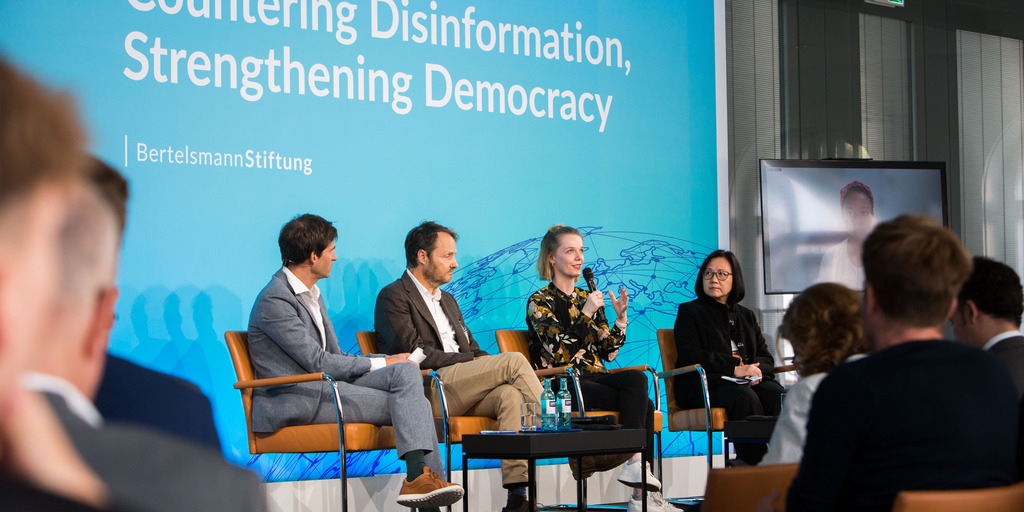
© Sebastian Pfütze
Cooperation as the Key to Countering Disinformation
Disinformation is a global phenomenon, which is why successful strategies to curb it can only emerge through international collaboration. With this in mind, the Bertelsmann Stiftung brought together around 130 experts from 25 countries for the "Countering Disinformation, Strengthening Democracy" conference in Berlin. The discussions made clear how great the need for mutual exchange is.
Content
"Disinformation Knows No Borders"
"Disinformation is a global challenge. It knows no borders. The actors who spread disinformation are technically savvy and connected. That's why it's important for us to network internationally and learn from each other," said Daniela Schwarzer, Executive Board Member of the Bertelsmann Stiftung, as she opened the "Countering Disinformation, Strengthening Democracy" conference. Hosted by the Bertelsmann Stiftung, the event brought together around 130 participants from 25 countries in Berlin. Whether the tech researcher from Brazil, the data journalist from Kenya, the fact-checking specialist from India, or the founder of an anti-disinformation initiative from Hungary: people from diverse backgrounds gathered here, exchanging ideas, best practices, and business cards, often realizing that people on the other side of the world face very similar challenges.
The conference marked the culmination of the work within the "Upgrade Democracy" project, which the Bertelsmann Stiftung launched at the end of 2022. In addition to publishing numerous studies, analyses, and discussion pieces on how to deal with disinformation, the project also conducted extensive international research. Over the course of several months, the team organized five workshops in Nairobi, Bangkok, Buenos Aires, Washington, and Brussels. These workshops brought Bertelsmann Stiftung experts together with initiatives, research institutions, NGOs, and other regional actors also tackling the issue of disinformation.
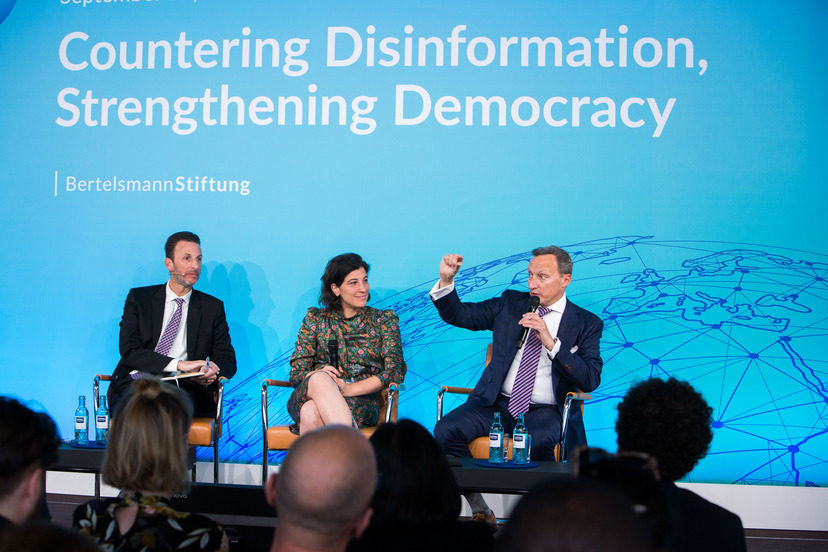
© Sebastian Pfütze
Panel discussion "Democracy implications: Spotlight on the U.S elections" with (from left to right): Anthony Silberfeld, Bertelsmann Foundation North America; Renee DiResta, author; David Becker, Center for Election Innovation & Research.
Strengthening Credible Voices Instead of Chasing Every Disinformation Rabbit Hole
Throughout these discussions, the role of disinformation campaigns in influencing elections frequently emerged, as it did during the conference itself. Naturally, much attention was focused on the upcoming U.S. presidential election. U.S. election experts, alongside colleagues from the Bertelsmann Foundation North America, provided valuable insights, such as the attacks on volunteer election officials or the strict vote-counting process, which makes election fraud nearly impossible but requires several days to complete. However, participants from Thailand, Indonesia, Poland, and Argentina also reported on disinformation efforts surrounding elections in their home countries. One key takeaway from these experiences: not every piece of disinformation can be captured. Thus, we should not exhaust our resources chasing every falsehood, but instead concentrate on strengthening credible voices that people can trust.
Several regional partners traveled to Berlin specifically for the conference to share their experiences from the workshops. Those who didn't get the chance to speak with them could turn to the regional reports or the comprehensive report, where the "Upgrade Democracy" team compiled the most relevant shared challenges and solutions in the fight against disinformation. A rich source of information is also the conference paper by Cathleen Berger and Kai Unzicker. In this paper, the two Bertelsmann Stiftung experts condense the findings from the project’s work into ten ideas on how to mitigate the threat disinformation poses to democracies: from cross-border knowledge-sharing, to promoting media literacy, and more evidence-based research, to labeling AI-generated content.
Careful Action to Protect Freedom of Expression
Certain topics repeatedly surfaced in the panels and breakout sessions at the conference: media literacy across all age groups, the responsibility of major social media platforms, the role of AI, the need for transparency regarding the structures, methods, and funding of anti-disinformation measures, the restoration of trust in credible information sources, and most importantly, the constant balancing act between protecting against disinformation and preserving freedom of expression as a core element of democracy.
In particular, the representatives of state institutions, such as from the German Federal Ministry of the Interior or the Swedish Psychological Defence Agency, emphasized that governments should act very carefully and thoughtfully to avoid undermining freedom of expression. The consensus that emerged from the discussions was: there is no silver bullet for combating disinformation. Instead, joint efforts are required from all stakeholders, whether from politics, business, science, the media, or civil society.
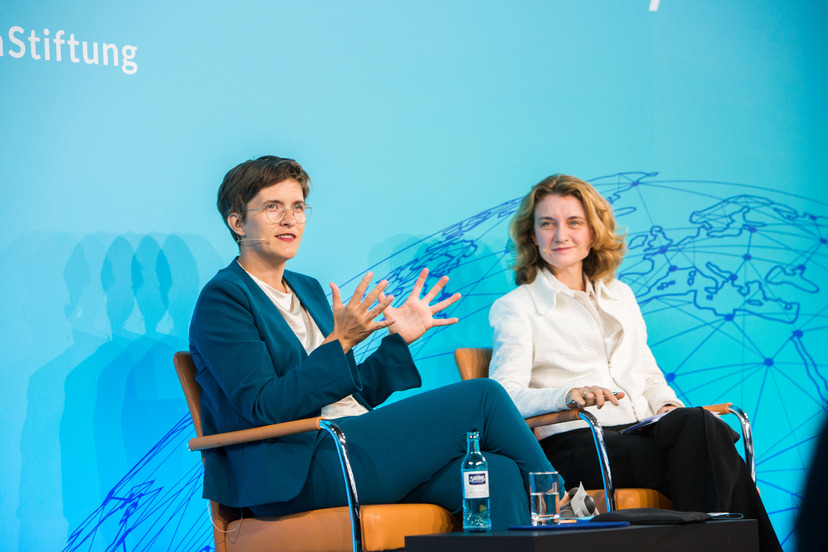
© Sebastian Pfütze
Anna Lührmann, Minister of State for Europe and Climate at the German Federal Foreign Office, in conversation with Daniela Schwarzer, Executive Board Member of the Bertelsmann Stiftung.
Putting Good Ideas into Practice
Anna Lührmann, Minister of State for Europe and Climate at the Federal Foreign Office, underscored this point in her conversation with Daniela Schwarzer about strategies to counter disinformation on both the German and European levels. She said, "We don’t have so much a knowledge problem, but increasingly an implementation problem. There are already so many good ideas in the world on how to curb disinformation. But as a society, we need to finally put them into practice and scale them to make an impact. There will always be criticism, but it's better to defend democracy and take the criticism than to do nothing at all."
Daniela Schwarzer also linked the fight against disinformation to the defense of democracy by highlighting other Bertelsmann Stiftung initiatives under the annual theme "Strengthening Democracy!" She mentioned projects like "faktenstark," which aimed to improve media literacy through workshops in rural areas of Saxony ahead of the state elections, as well as the innovative online participation format "Forum against Fakes," which distilled numerous citizen suggestions on dealing with disinformation into a report with recommendations for Federal Minister of the Interior Nancy Faeser. Additionally, she referred to the "Trusted Health Ecosystems" project, through which the Bertelsmann Stiftung's health program seeks to make credible health information online easier to find and more accessible. Lastly, she pointed to the Reinhard Mohn Prize, which will be awarded in February 2025 in Gütersloh, continuing the work of "Upgrade Democracy" and building on the content of the Berlin conference.
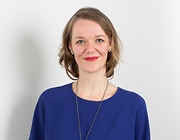
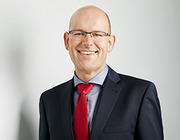
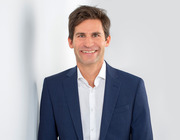
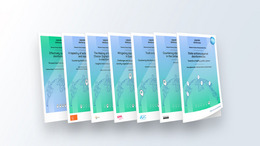
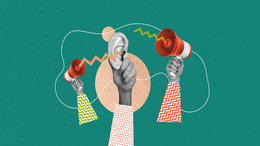
![[Translate to English:] viele Fragezeichen liegen übereinander. Auf der rechten Seite sticht ein rotes Fragezechen hervor.](/fileadmin/files/_processed_/c/2/csm_AdobeStock_204180371_KONZERN_ST-DZ_08_875fcc023d.jpg)


